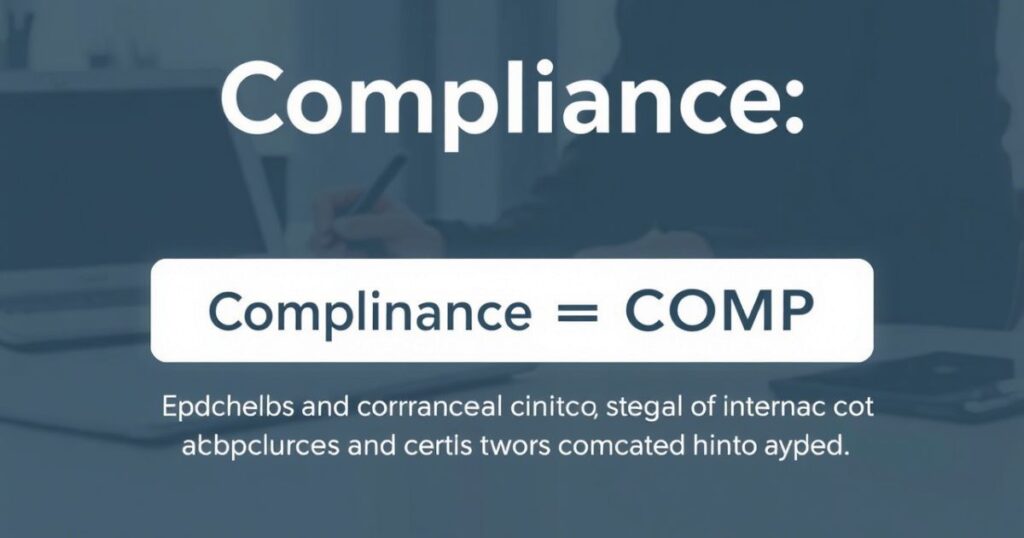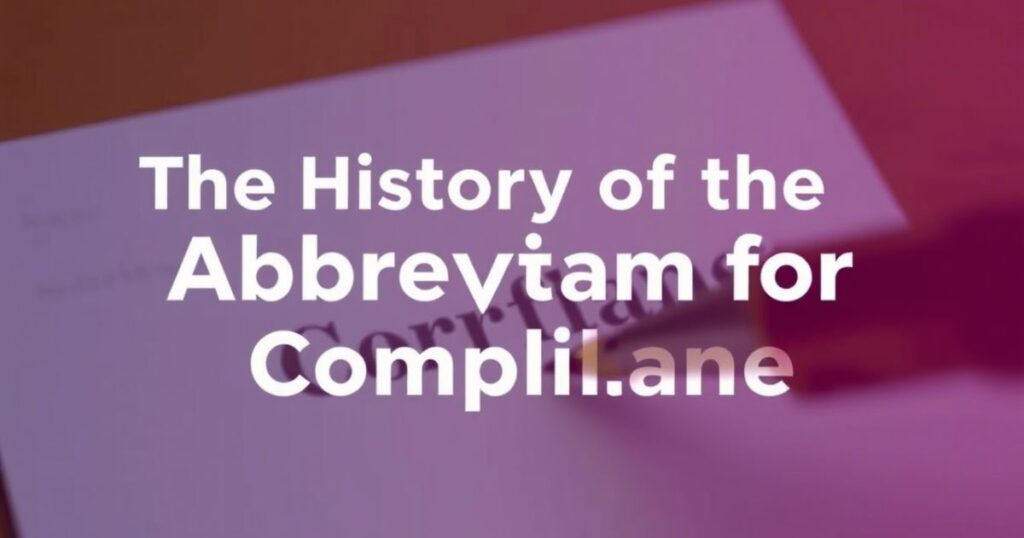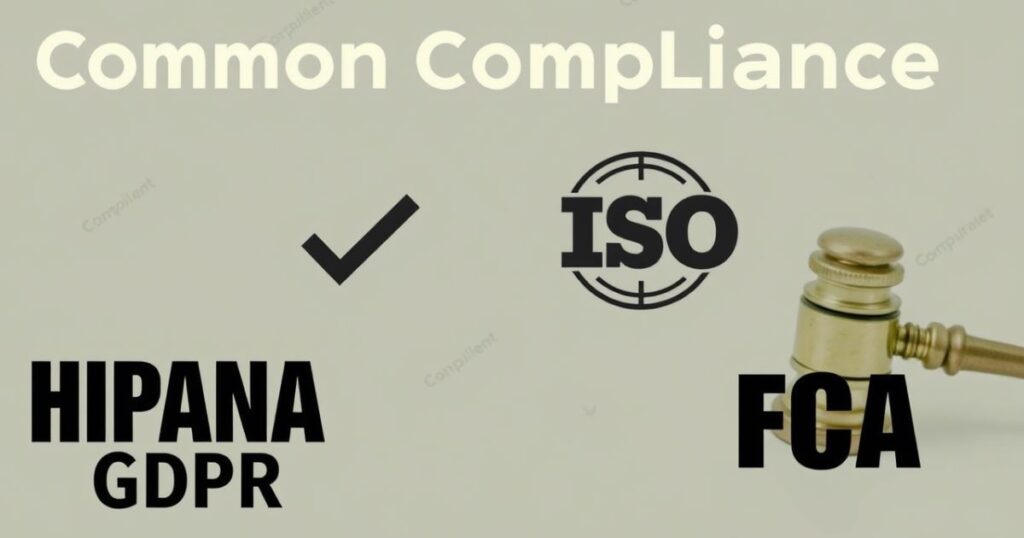Abbreviation for Compliance is important in many industries. It helps people understand rules and regulations quickly. Businesses, healthcare, and finance use abbreviation for compliance to follow laws. These short forms make legal terms easier to read. Many companies use compliance abbreviations in reports and policies.
A compliance abbreviation saves time and space in documents. It helps with safety, finance, and workplace rules. For example, HIPAA is a well-known abbreviation for compliance in healthcare. ISO is another compliance abbreviation used worldwide. Using the right abbreviation for compliance ensures clear communication. Companies must follow legal standards to avoid noncompliance.
What is the Abbreviation for Compliance?

Let’s start with the basics. Compliance is all about following rules, laws, and regulations. It’s a term often used in business, healthcare, finance, and many other industries. Companies and organizations must meet specific standards to ensure safety, ethics, and legal adherence. But when it comes to an abbreviation for compliance, there isn’t just one official version that everyone follows.
The most commonly used compliance abbreviations are “Compl.” and “Cpl.”. These short forms are useful in written documents, especially when space is limited. They appear in reports, policies, and legal papers to simplify communication.
For example:
- Compl. with industry safety regulations
- Cpl. with corporate policies and standards
However, not all businesses or professionals use these abbreviations. In many cases, it’s better to spell out the full word compliance to ensure clarity and avoid any misinterpretation.
Using an abbreviation for compliance can help streamline paperwork, but it’s important to use it in the right context. If you’re working with official documents, contracts, or legal agreements, writing the complete word may be the best choice. Always consider your audience and the purpose of the document before using an abbreviation.
How to Pronounce Abbreviation for Compliance
You might be familiar with the word compliance, but do you know how to pronounce it correctly? It’s not as difficult as it looks, and breaking it down can make it easier.
/kəm-PLAI-əns/
- kəm : sounds like “com” in “comfortable”
- PLAI : rhymes with “pie”
- əns : sounds like “us” in “confidence”
Now, try saying it aloud a few times: kəm-PLAI-əns. It’s a smooth, flowing word that becomes easier with practice.
When using compliance abbreviations, pronunciation isn’t always a concern since they are mostly written rather than spoken. However, understanding the correct pronunciation of compliance itself is important for professional conversations and presentations. Whether you’re discussing regulatory compliance, corporate policies, or business regulations, saying it correctly helps you communicate clearly and confidently.
What Does Abbreviation for Compliance Mean?
The abbreviation for compliance is a shortened form used in legal, corporate, and regulatory documents. It helps professionals communicate efficiently without writing the full word repeatedly. Compliance abbreviations are useful in industries like finance, healthcare, workplace safety, and environmental laws.
- Compl. (in legal documents) stands for compliance with laws and regulations.
- Cpl. (in corporate policies) is used to refer to following company rules.
- Compliance abbreviations (in financial reports) help simplify regulatory terms.
- Abbreviations for compliance (in business) save space in contracts and policies.
- Full compliance spelling (in official documents) prevents confusion in legal cases.
Common compliance abbreviations include “Compl.” and “Cpl.”, often seen in reports, compliance audits, and documentation standards. However, not all organizations use these abbreviations, as clarity is crucial in legal and regulatory settings. Spelling out compliance ensures there is no misunderstanding in critical documents.
Definition of Compliance
Compliance means following rules, laws, or guidelines set by authorities, businesses, or organizations. It ensures that individuals and companies adhere to legal, ethical, and industry standards. Compliance is essential in areas like healthcare, finance, workplace safety, and data protection.
For example, regulatory compliance ensures businesses follow government regulations, while corporate compliance focuses on internal policies and ethical standards. Noncompliance can lead to penalties, legal actions, or reputational damage.
Pronunciation of Compliance
The word compliance is pronounced as:
/kəm-PLAI-əns/
- kəm : sounds like “com” in “comfortable”
- PLAI : rhymes with “pie”
- əns : sounds like “us” in “confidence”
Say it aloud: kəm-PLAI-əns. It’s a clear and smooth word used often in professional settings.
Examples of Compliance in Sentences
- The company ensures compliance with all workplace safety regulations.
- Healthcare organizations must follow HIPAA compliance to protect patient data.
- Financial institutions implement strict compliance policies to prevent fraud.
- Environmental compliance laws help reduce pollution and protect nature.
- Employees undergo compliance training to understand company policies and legal standards.
Acronym vs. Abbreviation: What’s the Difference?
Let’s clear this up. An acronym is a word made from the first letters of a phrase, like HIPAA (Health Insurance Portability and Accountability Act). An abbreviation is just a shortened form of a word, like Compl. for compliance.
Acronyms are usually spoken as words (NASA, ISO), while abbreviations are read as their full form. In business regulations and corporate governance, both are used, but abbreviations are more common in compliance reports and audits.
Related Guide:
35 Similes for Christmas with Meaning, Examples, and Personal Reflections
When to Use the Abbreviation for Compliance
Wondering when to use it? The abbreviation for compliance is handy in financial compliance, corporate policies, and compliance audits. It saves space in legal standards and regulatory guidelines.
But be careful, some industries prefer spelling out compliance to avoid confusion. In healthcare compliance and data protection laws, clear communication is key, so abbreviations might not always be the best choice.
Synonyms and Antonyms for Compliance
Let’s mix things up. Want to know other ways to say compliance? Here are a few synonyms:
- Adherence (sticking to something)
- Conformity (doing what’s expected)
- Observance (following rules or customs)
And if you’re looking for the opposite, here are some antonyms:
- Noncompliance (not following rules)
- Defiance (purposefully going against rules)
- Disobedience (not obeying instructions)
So, next time you’re talking about regulatory compliance or policy enforcement, you’ve got more words to use!
The History of the Word Abbreviation for Compliance

Let’s go back in time. The word compliance comes from Latin, meaning “to fulfill or complete a request.” Over the years, it evolved to mean following rules, regulations, or laws.
In modern times, compliance abbreviation is used across business regulations, workplace safety, and industry standards. The term has grown in importance, especially with government regulations and compliance training becoming stricter in various industries.
Examples of Compliance in Context
Need real-world examples? Here’s how compliance is used in different fields:
- Healthcare Compliance: Hospitals must follow HIPAA to protect patient data.
- Financial Compliance: Banks must meet ISO standards to ensure security.
- Workplace Safety: Companies follow OSHA regulations for employee protection.
- Environmental Laws: Businesses must obey rules on pollution and waste disposal.
- Corporate Policies: Employees must follow internal guidelines for ethical behavior.
These examples show how compliance abbreviations are essential across industries, ensuring law enforcement and risk management.
Why Compliance is Important in Different Industries
Compliance plays a huge role in healthcare, finance, business, and environmental protection. Without regulatory compliance, companies risk legal penalties, data breaches, or financial loss.
For example, healthcare compliance ensures patient privacy through HIPAA, while financial compliance protects against fraud. In corporate governance, businesses follow ISO standards to maintain quality and safety.
Common Compliance Abbreviations You Should Know

There are many compliance abbreviations used across industries. Here are some key ones:
- HIPAA : Healthcare data protection
- OSHA : Workplace safety regulations
- SOX : Financial compliance for businesses
- ISO : International business and quality standards
- FCPA : Anti-corruption and bribery laws
Knowing these abbreviations for compliance helps in understanding government regulations, corporate policies, and compliance audits.
FAQ’s
What is Abbreviation for Compliance?
An abbreviation is compliance is a short form of legal or regulatory terms. It helps businesses follow laws, policies, and industry standards easily.
Why are Abbreviation for Compliance important?
They simplify complex regulations in industries like healthcare, finance, and safety. Using compliance abbreviations ensures clear communication and proper adherence to laws.
What are common Abbreviation for Compliance?
Examples include HIPAA for healthcare, ISO for industry standards, and OSHA for workplace safety. These compliance abbreviations help organizations meet legal requirements.
How does an Abbreviation for Compliance help businesses?
A compliance abbreviation saves time and reduces confusion in reports, policies, and audits. It ensures employees understand and follow necessary rules.
Where can I find Abbreviation for Compliance?
You can find compliance abbreviations in legal documents, corporate policies, and industry guidelines. Compliance training programs also teach these abbreviations.
Conclusion
Understanding abbreviation for compliance is important for businesses and organizations. These short forms make rules and regulations easier to follow. Many industries rely on compliance abbreviations to ensure legal and safety standards. Using the right compliance abbreviation helps with clear communication and reduces confusion. Companies must follow regulatory guidelines to avoid mistakes.
A well known abbreviation for compliance like HIPAA protects healthcare data. ISO ensures industry standards worldwide. Businesses use compliance abbreviations in reports, policies, and audits. A proper compliance abbreviation saves time and improves efficiency. Following these terms helps with legal and ethical responsibilities. Organizations must stay updated with abbreviation for compliance to avoid risks. Learning these terms is key to regulatory success.

Atlas Reid is an experienced administrator with 5 years of expertise in managing operations, streamlining processes, and ensuring efficiency. Skilled in leadership, organization, and problem-solving to drive business success.








